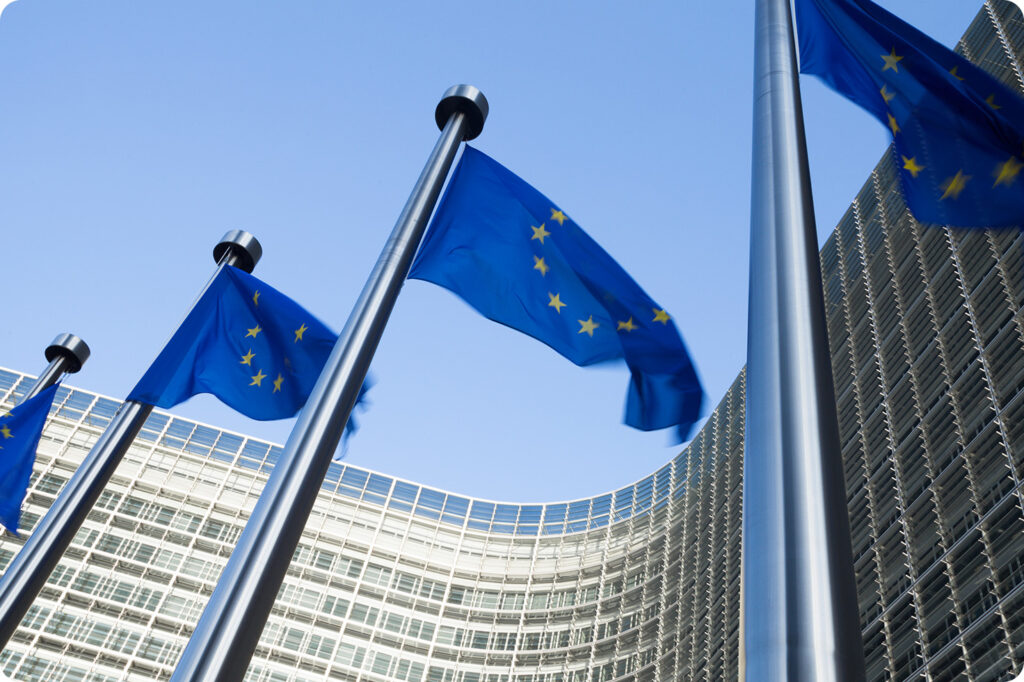The top five climate risk and disclosure stories this week.
Want access to deeper insights and curated climate news? Request a demo of our solution today.
European Commission finalizes sustainability reporting rules

The European Commission signed off on new climate and sustainability disclosure rules that will apply to around 50,000 companies starting in 2024.
The European Sustainability Reporting Standards (ESRS) underpin the European Union’s landmark Corporate Sustainability Reporting Directive (CSRD), a rulebook detailing what organizations have to disclose on social and environmental risks and opportunities. The ESRS are designed to ensure investors understand the sustainability impacts of the companies that they invest in.
In June, the Commission published a draft version of the standards that loosened some of the disclosure requirements initially promoted by the European Financial Reporting Advisory Group (EFRAG), an independent body providing technical guidance to the Commission on financial and sustainability disclosures. The ESRS that were adopted on Monday confirmed the watering down of these requirements.
Specifically, the Commission elected to make the disclosure of most ESRS climate and sustainability indicators conditional on a materiality assessment. This means a company would only have to disclose each indicator if it determined it was relevant to its business model and activities.
The Commission stressed that these requirements are “not voluntary” and that an organization’s process for judging materiality is “subject to external assurance,” meaning it has to be credible and robust. Furthermore, the Commission said that a company that states climate change is not material to its business “has to provide a detailed explanation” for this conclusion.
The European Parliament and Council will now scrutinize the ESRS for two months, with the potential for this period to be extended an additional two months. While they have the power to reject the standards, they cannot make any changes to them.
Once adopted, large companies will have to produce sustainability disclosures in line with the ESRS from 2025 based on the 2024 financial year, with smaller companies having to report in subsequent years.
International sustainability assurance standard unveiled

An international standard-setter debuted a global sustainability assurance standard designed to bolster the reliability of environmental and social information produced by companies.
If approved, the International Standard on Sustainability Assurance (ISSA) 5000 will be “the most comprehensive sustainability assurance standard” available to practitioners, according to the International Auditing and Assurance Standards Board (IAASB).
The standard has been drafted to accommodate multiple disclosure frameworks, including the sustainability and climate reporting requirements set out by the International Sustainability Standards Board (ISSB).
“Corporate reporting, whether financial or sustainability focused, is more trusted when it receives external and independent assurance based upon globally accepted standards independently developed in the public interest,” said IAASB chair Tom Seidenstein.
ISSA 5000 is open for public consultation until December 1.
UK to align sustainability disclosure standards with ISSB

Corporate environmental, social, and governance disclosure requirements in the UK will build on the International Sustainability Standards Board’s (ISSB) reporting rules, the government announced Wednesday.
The UK Sustainability Disclosure Standards (SDS) aim to surface companies’ sustainability-related risks and opportunities, including those from climate change. This is similar to the European Union’s recently released Corporate Sustainability Reporting Directive. The SDS will be drafted by the Department for Business and Trade and are expected to be endorsed by July 2024.
By pledging to align its standards with the ISSB’s, the UK intends for sustainability information published by companies to be “globally comparable and decision-useful for investors.” The government added that the final SDS “will only divert from the global baseline if absolutely necessary for UK specific matters.”
The announcement follows a call for evidence from the UK Financial Reporting Council (FRC) on whether to endorse the ISSB’s standards. The FRC oversees UK auditors, accountants, and actuaries. It is also responsible for setting standards on corporate governance and reporting in the country.
The council is part of the UK government’s Sustainability Disclosure Technical Advisory Committee (TAC), which will conduct a technical review of the ISSB’s standards and provide independent recommendations for their endorsement. A second body, the Sustainability Disclosure Policy and Implementation Committee (PIC), will govern the implementation of the SDS.
Asset managers retreat from climate resolutions — report

Asset managers backed off from climate resolutions at public companies in 2022, with US investment firms cutting support the most, a new report shows.
The average asset manager backed 50% of climate resolutions in 2022, down from 61% the year prior. Among US managers, average support fell to 36% in 2022 from 50% in 2021. The finding is part of sustainability think tank InfluenceMap’s latest asset managers and climate change assessment, which evaluated the climate progress of 45 major firms.
The assessment concluded that asset managers have made scant progress toward climate goals since 2021, notwithstanding their affiliation with groups like the Net Zero Asset Managers Initiative (NZAMI). The study claims 95% of managers’ stock portfolios are misaligned with the 2015 Paris Climate Agreement and that they retain 2.8 times more equity value in fossil fuel producers than in climate-friendly companies. US and Japanese managers are particularly misaligned, the study says.
Asset managers are also moving backward on investment stewardship practices. Only 18% of firms were graded ‘A’ by InfluenceMap for these activities, down from 33% in 2021. European managers including Legal & General Investment Management, UBS Asset Management, and BNP Paribas Asset Management outperformed on climate stewardship, while US heavy hitters BlackRock, Vanguard, Fidelity Investments, and State Street Global Advisors lagged behind.
InfluenceMap urged asset managers to step up their engagements with climate-relevant sectors and companies, as well as to improve their shareholder voting processes to help close the ‘say-do’ gap on their net-zero commitments.
PCAF standard to cover 33% of facilitated emissions

Banks may only have to disclose one-third of the emissions linked to their stock and bond underwriting activities under an industry-led carbon footprinting standard.
The Partnership for Carbon Accounting Financials (PCAF) — a coalition of banks, asset managers, and other firms that develop and implement financed emissions disclosures — is currently working on a “facilitated emissions” methodology. This could be used by companies to calculate and report the climate impact of their stock and bond dealmaking.
The methodology would close an important gap in financed emissions disclosures since banks provide a hefty amount of financing to fossil fuel companies and other carbon-intensive industries by underwriting their bond and equity sales. PCAF already has standards in place for financial institutions to calculate the financed emissions of their direct investments and loans.
Bloomberg reports that the eight-member working group charged with drafting the methodology has voted for disclosing just 33% of these facilitated emissions. Two members voted for 100% to be reported. Barclays and Morgan Stanley lead the working group.
Bond and equity sales facilitated by underwriting banks often don’t stay on their balance sheets for long. As a result, some firms say they shouldn’t be held responsible for all the associated emissions.
Climate activists disagree. “The mission of [the] Partnership for Carbon Accounting Financials … is to ‘facilitate transparency and accountability of the financial industry to the Paris Agreement’,” Beau O’Sullivan, communications strategist at The Sunrise Project wrote on LinkedIn. “So why are they allowing banks to be only 33% transparent and accountable to the Paris Agreement? Why do banks get a massive discount on their climate ambition? Can we all just do 1/3 of the work required to keep catastrophic warming to below 1.5 degrees?”

